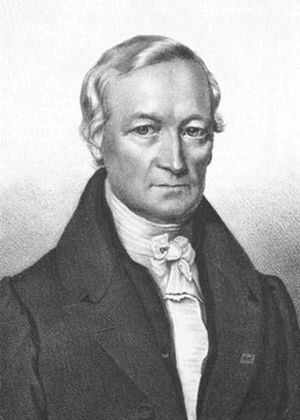Friedrich Tiedemann facts for kids
Quick facts for kids
Friedrich Tiedemann
|
|
|---|---|

Tiedemann in 1820
|
|
| Born | 23 August 1781 |
| Died | 22 January 1861 (aged 79) |
| Relatives | Gustav Tiedemann (son) Heinrich Tiedemann (son) |
| Scientific career | |
| Fields | Anatomy |
| Doctoral advisor | Johann Wilhelm Christian Brühl |
| Other academic advisors | Conrad Moench Georg Wilhelm Stein Adalbert Friedrich Marcus Carl Caspar von Siebold Franz Kaspar Hesselbach Georges Cuvier |
| Influences | Friedrich Wilhelm Joseph Schelling Samuel Thomas von Sömmerring |
| Signature | |
Friedrich Tiedemann (born August 23, 1781 – died January 22, 1861) was an important German scientist. He was an expert in anatomy (the study of body structures) and physiology (the study of how the body works). He was especially known for his work on the human brain.
Tiedemann spent most of his career as a professor at Heidelberg University. He taught anatomy and physiology there starting in 1816. Before that, he was a professor at Landshut University for ten years. He was recognized by many scientific groups, including the Royal Swedish Academy of Sciences.
Contents
Life and Career
Friedrich Tiedemann was born in Cassel, which is now part of central Germany, in 1781. His father, Dietrich Tiedemann, was a well-known philosopher and psychologist.
Friedrich studied medicine at several universities, including Marburg University, from 1798. He earned his medical degree from Marburg in 1804. After a short time working as a doctor, he decided to focus on teaching and research.
In 1804, he became a lecturer in physiology and comparative osteology (the study of bones) at Marburg University. Just one year later, in 1805, at the age of 24, he became a full professor. This was at Landshut University, where he taught zoology, human anatomy, and comparative anatomy.
In 1816, Tiedemann moved to Heidelberg University. He became a professor of physiology and anatomy there and stayed until he retired in 1849. He was also elected as a member of important scientific societies, like the Royal Society of London in 1832.
Friedrich Tiedemann passed away in Munich on January 22, 1861. He is buried in the Alter Südfriedhof (Old South Cemetery) in Munich.
Scientific Ideas and Discoveries
Tiedemann was very interested in natural science. When he visited Paris, France, he became a big fan of the famous scientist Georges Cuvier. When he returned to Germany, Tiedemann focused on careful anatomical research. He often disagreed with other scientists who relied more on theories than on direct observation.
One of his most important contributions was his study of how the human brain develops. This work connected with his father's studies on how intelligence grows.
Challenging Racism with Science
Friedrich Tiedemann was one of the first scientists to challenge racism using scientific evidence. In 1836, he wrote an important article called "On the Brain of the Negro, compared with that of the European and the Orang-outang."
In this article, he shared measurements of brains and skulls from Europeans and black people from different parts of the world. He argued that the common belief at the time—that black people had smaller brains and were less intelligent—was not true. He showed that these ideas were based on prejudice, not on science.
His work helped to show that all humans, regardless of their race, have similar brain sizes and intellectual abilities.
Views on Evolution
Tiedemann was also influenced by Jean-Baptiste Lamarck, another scientist who believed that species could change over time. Tiedemann thought that higher animals, during their development as embryos, showed stages that looked like lower animals. This idea is related to the concept of evolution, where species gradually change over long periods.
He also suggested that sexual selection (where certain traits help animals find mates) helps prevent weaker males from having offspring. He also saw that fossils showed how species slowly changed over geological time.
Family Life
Friedrich Tiedemann was married twice. First, he married Frauline von Holzing in 1807. Later, he married Charlotte Hecker.
He had a daughter named Elise. Two of his sons, Gustav Tiedemann and Heinrich, also became notable. Gustav was involved in the Revolutions of 1848 in Germany. His son Heinrich moved to Philadelphia in the United States and became a doctor there.
Legacy
In 2007, a Brazilian geneticist named Sergio Pena called Friedrich Tiedemann an "anti-racist ahead of his time." This shows how important his scientific work against racism was, even many years later.
Images for kids
See also
 In Spanish: Friedrich Tiedemann para niños
In Spanish: Friedrich Tiedemann para niños
 | Janet Taylor Pickett |
 | Synthia Saint James |
 | Howardena Pindell |
 | Faith Ringgold |


